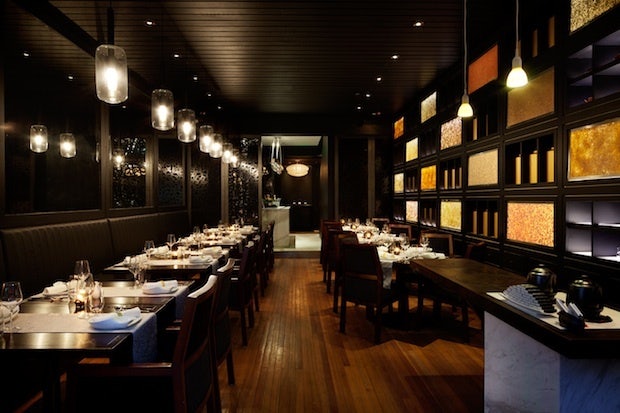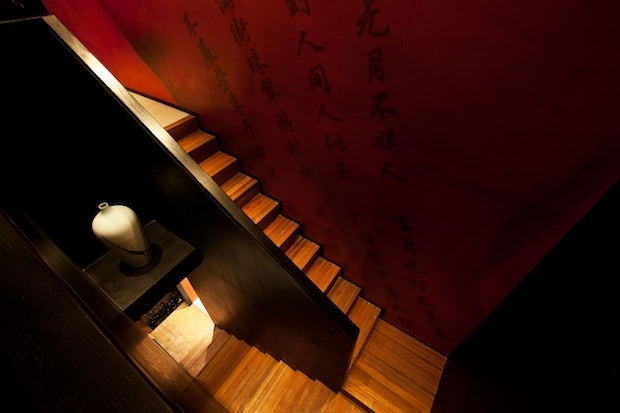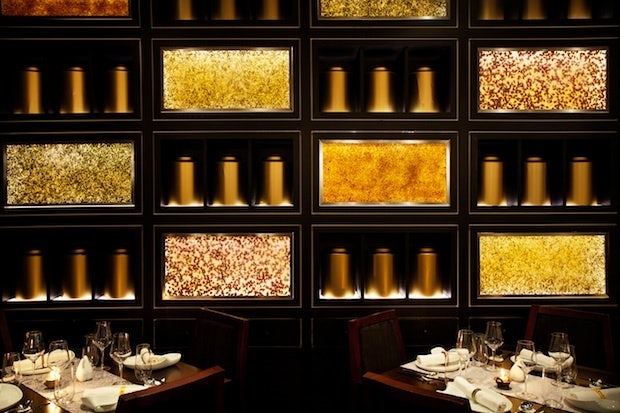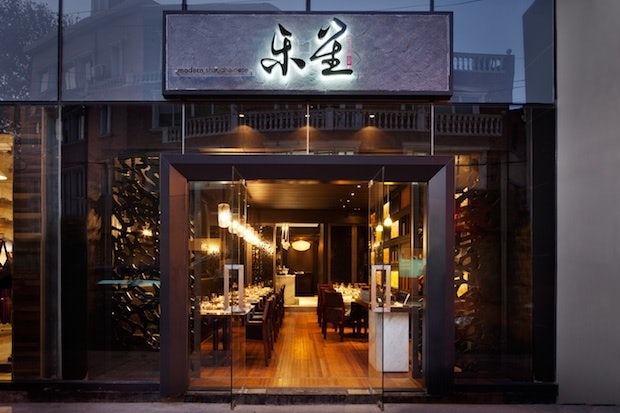Laris Recently Launched "Modern Shanghainese" Restaurant Le Sheng#
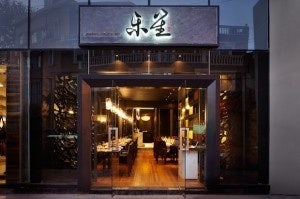
Since setting down roots in Shanghai nearly a decade ago, Australian chef
David Laris#
has become a fixture in the city’s rapidly evolving dining scene. Arriving at Three at the Bund in 2002, Laris led his eponymous Laris Restaurant from 2003-2010, helping to build the market for contemporary fine dining in Shanghai. Currently, Laris operates several F&B concepts across a diverse range of restaurants in Shanghai, including his Yucca Lounge, Mediterranean-infused Fat Olive, and 12 Chairs — “one of the smallest fine dining restaurants in China.”
Earlier this year, Laris opened his first Chinese restaurant, "modern Shanghainese"
Le Sheng#
(乐笙). Headed by a team of local chefs led by Fang Chao, Le Sheng puts a contemporary spin on local classics and fusion dishes, offering diners a distinctly Chinese experience centered around a curated list of Chinese teas and infused baijiu.
Recently, Jing Daily Shanghai correspondent Rex Jiang caught up with David Laris at Le Sheng to discuss his newest restaurant venture, the particularities of the Chinese fine dining scene, and the possibility of expanding his Shanghai-based empire into international markets.
Jing Daily (JD): The design and decor here feel very Chinese but also very different. You say that this restaurant is "modern Shanghainese," but what is that exactly?#
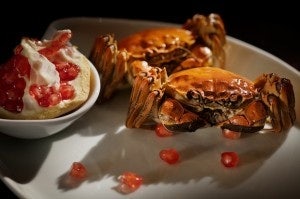
David Laris (DL)#
: The idea was to respect the actual authenticity of the food, but present it in a modern package. I think you picked up on the things that we're going for. We wanted Le Sheng to be eclectic. We wanted the design to be something very fresh and contemporary but still very Chinese, right down to the name. We worked with a Chinese poet and artist who helped us come up with the name, and got a Chinese calligraphy master to work with a Western graphic designer for the logo. We also worked with a Chinese tea master, a 70-year-old guy who worked with us on a tea menu and worked with our tea sommelier. We've tried really hard to make sure we were respecting the Chinese sensibility and the food.
All along the way, we've said that I'm not doing the food at Le Sheng. What I'm doing is working with the chef, helping him find produce, looking at new avenues of sourcing, taking MSG out of the menu, working with base stocks and not cutting corners. And when it comes to plating, presenting the food in a clean, fresh style. You can modernize it without taking out what people love.
JD: What kind of crowd are you getting?#
DL#
: The majority of our big spenders are Chinese. We get the guys spending 1,000 yuan a head in the private rooms, and we've sold the VIP cards, 10,000 to 20,000 yuan. We've made it very much accessible to the local market and, at the same time, we get a lot of the Western crowd when they want to take people to a place where they feel comfortable.
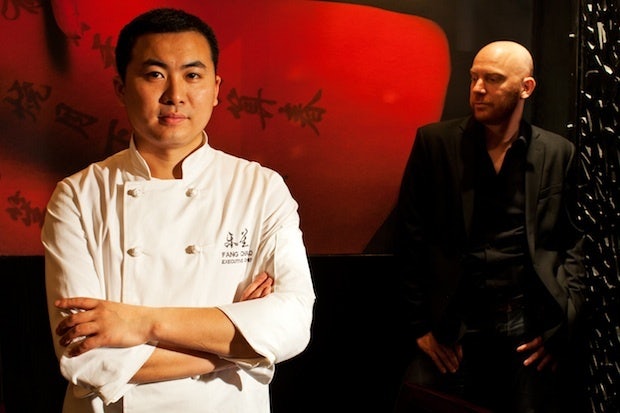
JD: What about the concept of Le Sheng -- how'd it come about?#
DL#
: We'd always wanted to do a Chinese restaurant, as a group living in China we wanted to show that we could do a Chinese restaurant. The gentleman who's a majority shareholder came to me and said he wanted to do a Shanghainese restaurant in a cool space. He'd been onto me for years about it. Then he called me one day and said, "David, I've rented the space, so you have to do it now." I said okay, I'll do it. Then I was sitting down with my team to discuss how to re-imagine a cool Shanghainese restaurant, adding textures to it and a service standard and so on, things that bring it to life but where Shanghainese people can walk in and feel that it's real.
My Chinese is terrible, so everything is done with my chef through an interpreter, and he's really into what we're trying to do here. That's how it came about, and this was the result. Hopefully we'll do more of them. Certainly it's going well so far. We've wanted to bring in a lot of service standards that we're still working on. There are still layers I want to add on. Lately I've been talking with guys in Moganshan, trying to work with some smaller producers, getting some crazy stuff, but it's hard to get a consistent stream. We've found these oyster mushrooms that grow on drying rice bales, and you have to convince farmers to harvest them for you. We're trying to break ground in this area.
JD: Have you picked up on things you might want to change or adapt since opening?#
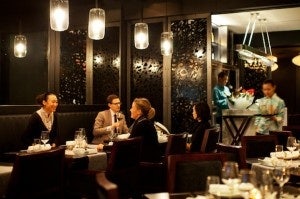
DL#
: At lunch, I think I'm going to go with a kind of Hong Kong-style setting actually, in terms of the menu and placemats, because we realize we may look a little formal for lunch, and we are on the street alongside other cafes. We do all right for lunch, but the majority of our trade is the tea and dinner trade, which has gone very well for us. But at the same time, I'm going to work to make this cool setting, a bit urban, because sometimes it looks a bit formal and that can scare people off a bit for lunch. We're only about four months old now.
JD: It's interesting you say the majority of your customers are Chinese, did you expect that? Have you seen any sort of pushback from locals?#
DL#
: Not really. I think we had one guy look in and say it "wasn't Chinese enough." It was a random neighbor, but that was it. I was expecting quite a bit more, to be honest, but overall the response has been very good and I've had more people come up and say, "This is great, do more Chinese restaurants in the city." And I really appreciate it. I think what you have to realize about what's going on in China and Shanghai is -- I've been here 10 years, I've helped build the industry. I've got a presence online -- at this point I think more Chinese people know who I am than Westerners. So it has this effect of not being an issue anymore. I'm sort of part of the landscape. I think you have to be here for nine years before you're a local, right? (laughs)
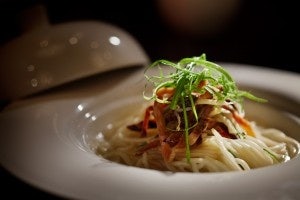
So, all in all, there's been more curiosity rather than any angst about it, and that curiosity has fed well for us. And I'm very pleased with it. [Le Sheng] certainly is something we've wanted to do, and we are probably going to do more Chinese concepts.
JD: What has the reaction been in terms of the reaction your chefs have had to you breaking into Chinese cuisine?#
DL#
: Well the thing is, we're both learning. They're learning from me and I'm learning from them. The chef we have here now previously spent some time with me at 12 Chairs, so he got to see something that he's never in his life ever conceived, the style that I do there. He never worked with jellies and foams and the processes that I use there. There's a certain methodology to the way I approach cuisine at 12 Chairs, and when he was there he was tasting everything and taking photos and notes. So I'm saying to him, you come and work with me in my environment, and anything that you can take away. If you want to create a Shanghainese dish with some of these techniques, I'm all ears.
For him, it's pretty interesting, and in terms of what he does as a chef [here], I respect his territory. I might go, "This plating's not cool, make sure we're not using MSG"...I try to keep him on track. Simple presentation is what it's all about for us.
The whole idea is being able to take [the Le Sheng concept] to London, to New York, take it anywhere. I've had international guests come in and say it's the best Chinese food they've had, because it's the first time they've tried Shanghainese cuisine. That's also an important part of what we do here. Our major shareholder here is a Shanghainese guy, and he wants to create a modern version of a Chinese restaurant that he can be proud of. And he comes in here a lot, and with a view to take it overseas and show the world. We're in a development stage.
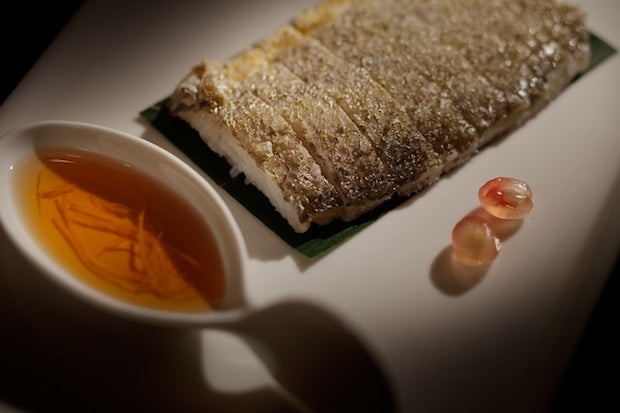
JD: Building on that, do you feel that China's a particularly difficult fine dining market? If you're able to succeed in Shanghai with this concept, do you think you'd be able to succeed in New York or somewhere else?#
DL#
: I think if you can survive and succeed here, you can survive anywhere.
JD: So have you put together plans to actually expand outside of Shanghai, whether Le Sheng or another of your concepts?#
DL#
: The next place we'll go is most likely Hong Kong. In terms of where we sit in the world, our concepts have made the Condé Nast 50 Best Restaurants in the World -- I did that with a couple of concepts with the Opposite House in Beijing, I did it with Laris in 2009. We've been here in China and gotten global recognition and press alongside the big names. China has come onto the map as a place that people are paying attention to. I'd love to do stuff in other parts of the world, but that's not what drives me everyday. I don't feel like if I don't succeed in New York that I haven't succeeded.
I think in Asia, there's more money being spent on concepts, there's a more interested market, there's a lot of creativity and there's a lot of fresh blood here. So I think increasingly what we'll see is concepts born in Asia, in China and in Hong Kong, which will go the other way. And that's always been my ambition. We don't need New York or London to tell us how it should be done. I have a lot of reverse patriotism towards Asia, which is kind of funny because you'd expect it to be the other way around, but I'm very loyal to Asia. I've been in Asia most of my life -- I'm originally from Australia, which you could say is pretty close to Asia -- not to say we're not all learning from each other.
But I don't really like the attitude you sometimes get from London or New York, looking at China and saying "these guys aren't capable of producing a quality product." It's simply not true. And as this economy gets stronger and there's more money being invested in the dining industry, the more we'll see the birth of great things. So I'd like to do things overseas. I will. But it's not what drives me at this moment.
Come back tomorrow for part two of Jing Daily's interview with David Laris, covering his upcoming projects, thoughts on the Shanghai scene, and the emergence of a less status-obsessed high-end diner.#
